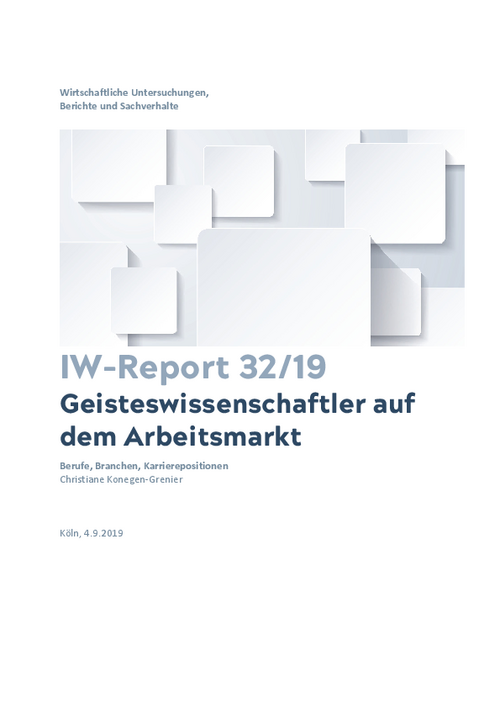With a share of 8.2 per cent of all students and a share of 5.6 per cent of all approximately nine million employed graduates, the humanities graduates, without considering the teaching graduates, represent a comparatively small group in study and employment. Their most striking difference to the average of graduates is their high proportion of women, which in turn leads to an above-average proportion of mostly voluntary part-time employment.

Humanities scholars on the labour market
IW-Report

With a share of 8.2 per cent of all students and a share of 5.6 per cent of all approximately nine million employed graduates, the humanities graduates, without considering the teaching graduates, represent a comparatively small group in study and employment. Their most striking difference to the average of graduates is their high proportion of women, which in turn leads to an above-average proportion of mostly voluntary part-time employment.
All in all, the humanities graduates are less well off than the average of graduates. However, their situation is not dramatic. Unemployment is in the average of the population as a whole, and the majority of humanities graduates is neither marginally employed nor employed for a limited period of time, nor self-employed.
The flexibility of their careers is particularly noteworthy: about half of all humanities graduates work in occupations and sectors which are not or less related to their field of study . Obviously, many humanities graduates are able to familiarize themselves with foreign topics: In spite of the wide variety of branches and professions, there is a clear focus on communicative and didactic activities as well as on activities in the service sector.
The adequacy of employment was measured on the basis of the three indicators 'job requirement level', 'frequency of management and supervisory tasks' and 'net income'. Humanities graduates are more frequently employed inadequately than the average of graduates. However, if only full-time workers are considered, humanities graduates achieve almost as often a level of activity that corresponds to the academic education as the average of graduates. Although the differences are larger in terms of career positions and, above all, in terms of income, the majority of humanities graduates, like the majority of all graduates, belong to a middle income group. The adequacy of employment for full-time humanities graduates varies according to personal and professional characteristics: The results are less favourable than the average for women, younger employees, Bachelor's and Master's graduates and those employed in professions and sectors that are not typical for their field of study, whereas the situation is more favorable for male graduates and experienced professionals. With a doctorate, the humanities graduates are even in a better position than the average of all graduates in terms of the three indicators for job adequancy. The picture of the taxi driver Dr.phil. proves to be unfounded.

Christiane Konegen-Grenier: Geisteswissenschaftler auf dem Arbeitsmarkt – Berufe, Branchen, Karrierepositionen
IW-Report

Christiane Konegen-Grenier / Beate Placke / Mathias Winde: Bietet die Digitalisierung Beschäftigungschancen für Geisteswissenschaftler?
Externe Veröffentlichung
More on the topic

The Regional Distribution of Graduates in Germany
Graduates in Germany are distributed very unevenly across the country. Taking the population aged between 35 and 44, who have generally already completed their higher education, in 2019 the highest proportions of university graduates were to be found in Berlin ...
IW
The Regional Distribution of Low-skilled Workers in Germany
Low-skilled workers in Germany are heavily concentrated in urban areas. In 2019, the proportion of 25- to 64-year-olds who had not completed at least two years of vocational training or higher education was almost twice as high in cities with a population of ...
IW